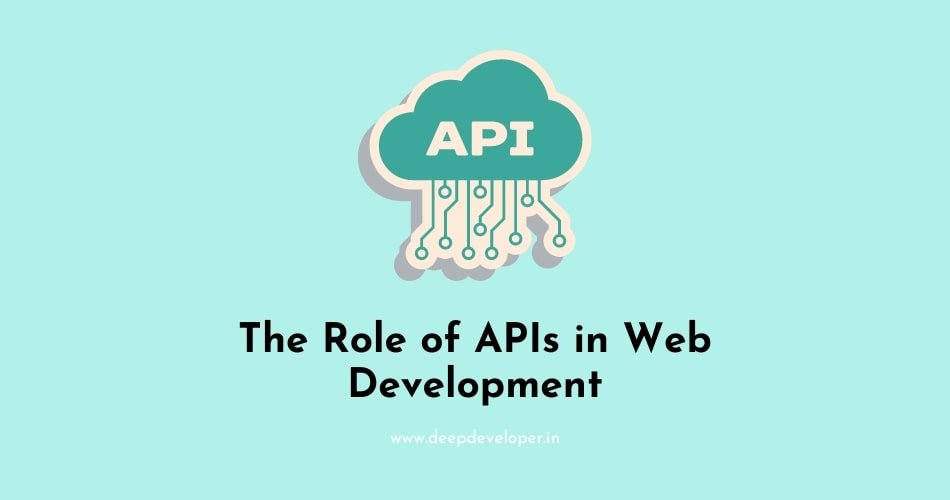APIs or Application Programming Interfaces are widely used in web development to access the functionalities of external services. They are a set of protocols and tools that allow communication between different software systems. APIs come in various forms, including web APIs, internal APIs, and many more. In this blog post, we will discuss the role of APIs in web development, their importance, and how they are beneficial for creating more efficient and feature-rich web applications.
What is API?
An API, or Application Programming Interface, is a set of protocols and tools for building software applications. APIs enable communication between different software systems and allow developers to interact with the data and functionality of external services. APIs can take many forms, including web APIs, which allow communication over HTTP or HTTPS, and internal APIs, which are used within a company’s own software systems.

The Importance of APIs
APIs play a crucial role in modern web development for several reasons. They allow developers to access data and functionality from external services, providing them with the ability to create more efficient and scalable web applications. Furthermore, APIs allow developers to build more complex and feature-rich applications by combining functionalities from different services.
APIs also enable companies to monetize their data and services by making them available to other developers. This results in the creation of new products and services that would not have been possible without the use of APIs. Additionally, APIs enable developers to build applications more quickly, with less overhead.
The Role of APIs in Web Development
APIs play an essential role in web development. They enable developers to create more personalized and engaging experiences for users by integrating functionalities from external services. For example, an e-commerce website can use an API to personalize product recommendations based on a user’s browsing history.
APIs also allow developers to create more efficient web applications by offloading certain tasks to external services. For example, an application can use an API to send email notifications instead of building its email infrastructure.
APIs provide developers with the flexibility to switch between services and scale their applications up or down as needed. This flexibility results from the abstraction of underlying technology and infrastructure, which enables developers to use various services without worrying about the specifics of their implementation.
Examples of APIs
APIs in Finance and Banking
APIs have become a crucial part of finance and banking in recent years. With the rise of fintech companies, APIs have enabled banks to provide their services to these companies, which in turn can offer new and innovative services to customers. For example, Plaid is a financial technology company that uses APIs to connect banks with fintech companies to provide services like budgeting and investment tracking.
APIs in Media & Publishing
Media and publishing companies have also started using APIs to improve their offerings. For instance, The New York Times provides an API that allows developers to access articles, photos, and other content from the newspaper’s archives. This has enabled developers to create new applications that analyze the content of The New York Times and provide new insights to readers.
APIs in Retail & Ecommerce
APIs have played a significant role in retail and ecommerce. For example, Amazon provides APIs that allow retailers to integrate their products with Amazon’s platform. This has enabled retailers to reach a broader audience and benefit from Amazon’s extensive customer base.
APIs in Education
APIs have also been used in the education sector to enhance learning and improve student outcomes. For instance, Khan Academy provides APIs that enable developers to integrate their online courses and tutorials with other educational platforms. This has allowed students to access a more comprehensive range of educational resources and benefit from personalized learning experiences.
APIs in Travel & Tourism
APIs have become increasingly important in the travel and tourism industry. For example, Airbnb provides APIs that allow developers to integrate Airbnb listings into travel apps and websites. This has enabled travelers to find and book unique accommodations in new locations, increasing the variety of options available to them.
APIs in Healthcare
APIs have become an essential tool in the healthcare industry, enabling the integration of medical data and services. For example, Fitbit provides APIs that allow health professionals to access and analyze data from the company’s fitness trackers. This has enabled health professionals to create personalized wellness plans for patients and improve patient outcomes.
APIs in manufacturing
APIs have also been used in the manufacturing sector to improve supply chain management and manufacturing processes. For example, General Electric provides APIs that enable manufacturers to access data from GE’s machines, sensors, and systems. This has enabled manufacturers to optimize production processes and improve product quality.
APIs have transformed the way different industries operate, enabling the integration of data and functionalities to create new and innovative services. From finance and banking to healthcare and manufacturing, APIs have become a vital tool in many industries, offering new opportunities for growth and development.
Also Read:
Conclusion
APIs play a vital role in modern web development, allowing developers to access data and functionality from external services, build more complex and feature-rich applications, and create personalized and engaging experiences for users. APIs also provide companies with the opportunity to monetize their data and services, leading to the creation of new products and services. The flexibility and scalability provided by APIs enable developers to switch between services and scale their applications up or down as needed. As web development continues to evolve, the role of APIs will continue to be essential.

